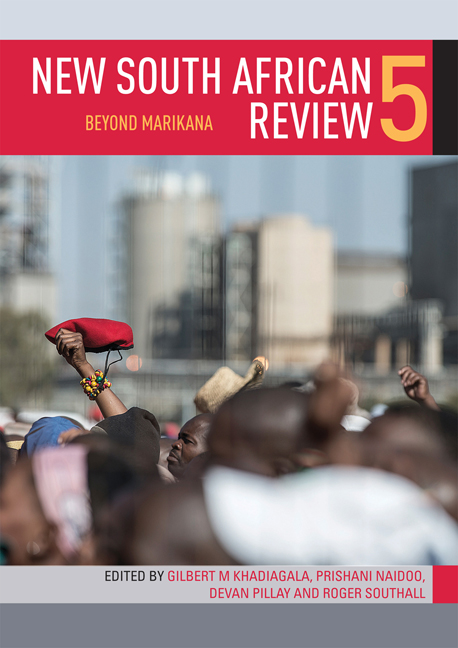Book contents
- Frontmatter
- Contents
- Preface
- Introduction: Political reconfigurations in the wake of Marikana
- PART 1 NEW POLITICAL DIRECTIONS?
- PART 2 ECONOMY, ECOLOGY AND LABOUR
- PART 3 STATE AND SOCIETY
- PART 4 SOUTH AFRICA IN THE INTERNATIONAL ARENA
- Introduction to Part 4
- Chapter 13 The evolution of South Africa's foreign policy
- Chapter 14 South Africa, the BRICS and human rights: In bad company?
- Chapter 15 Trading with the frenemy: How South Africa depends on African trade
- Contributors
- Index
Chapter 15 - Trading with the frenemy: How South Africa depends on African trade
from PART 4 - SOUTH AFRICA IN THE INTERNATIONAL ARENA
Published online by Cambridge University Press: 21 April 2018
- Frontmatter
- Contents
- Preface
- Introduction: Political reconfigurations in the wake of Marikana
- PART 1 NEW POLITICAL DIRECTIONS?
- PART 2 ECONOMY, ECOLOGY AND LABOUR
- PART 3 STATE AND SOCIETY
- PART 4 SOUTH AFRICA IN THE INTERNATIONAL ARENA
- Introduction to Part 4
- Chapter 13 The evolution of South Africa's foreign policy
- Chapter 14 South Africa, the BRICS and human rights: In bad company?
- Chapter 15 Trading with the frenemy: How South Africa depends on African trade
- Contributors
- Index
Summary
South Africa's transition from apartheid to nonracial democracy prompted major changes in the country's political relations with the rest of the African continent. Emerging from international isolation, the democratically elected government sought to turn the old South Africa's worst enemies in the region into the new South Africa's best friends – and to fashion a foreign policy that accorded Africa a central position. The vision of an ‘African Renaissance’, articulated by former president, Thabo Mbeki, sought to fuse the ideals of democracy and human rights, pivotal to the struggle against apartheid, with a commitment to African solidarity and the pursuit of regional economic development. This vision was embodied concretely in the New Partnership for Africa's Development (Nepad), which the South African government succeeded in establishing as the African Union's flagship development initiative. The central premise of Nepad was that good things go together: that governing according to principles of democracy and human rights is desirable in itself and that it also provides the foundation for regional economic integration and development.
The idealism of this vision of South Africa's relations with the rest of Africa was countered by a sceptical realism. For realists, there are no such things as friends and enemies in international relations, only interests. Sceptical realists questioned how South Africa's interests could lie in a region that accounts for a tiny sliver of the global economic pie. Linking South Africa more tightly to the rest of Africa may have been emotionally satisfying, but for sceptics this sentiment distracted from the country's true interests. If South Africa was serious about using its foreign policy to pursue the objectives of growth and employment should it not be focusing on relations with the established powers of the industrialised world and with the major emerging powers such as Brazil, Russia, India and China (the ‘other BRICS’)? If it was going to venture into the rest of Africa, should it not at least stick to economics rather than meddling in domestic governance? A more visceral version of this sceptical realism flared in 2008 and again in 2015, in waves of violence directed against other Africans: in the face of pressing material hardships, African solidarity came to look like a luxury many South Africans think they cannot afford.
- Type
- Chapter
- Information
- New South African Review 5Beyond Marikana, pp. 284 - 297Publisher: Wits University PressPrint publication year: 2015



